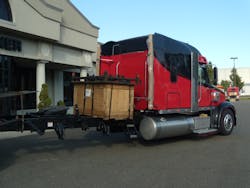OOIDA throws support behind effort to repeal glider kit rules
The Owner-Operator Independent Drivers Association (OOIDA) is throwing its support behind efforts to repeal Phase 2 greenhouse gas (GHG) rules that restrict and eventually eliminate the use of remanufactured truck engine packages known as “glider kits.”
The group noted in a letter sent to the Committee on Environment & Public Works that glider kits provide “an appealing cost savings” to independent truck operators and small fleets
“Since 2002, federal environmental regulations have increased the price of a new truck between $50,000 and $70,000,” OOIDA said in its letter. “Given their unique assembly, glider kit prices are typically 25% to 30% less than a new truck, allowing owner-operators, who often work on the slimmest of margins, to save tens of thousands of dollars on their purchase.”
The Environmental Protection Agency (EPA) has estimated about 10,000 gliders are manufactured annually and make up about 5% of the entire Class 8 truck market. However, gliders could account for about one-third of all nitrogen oxides and particulate matter emissions from the sector, according to the agency.
Citing “the regulatory overreach” of the Obama administration, new EPA administrator Scott Pruitt ruled gliders should not be regulated as “new motor vehicles” or “new motor vehicle engines” under the Clean Air Act and is proposing to repeal the Phase 2 GHG rules covering them.
The group added that, based on a recent study by Tennessee Tech University, glider kit engines are also “reliable, efficient, and meet all of the required environmental and safety standards necessary for operation.”
In that study, an array of remanufactured engines and original equipment manufacturer (OEM) “certified” engines were evaluated for fuel efficiency and emission standards, OOIDA said, with researchers discerning that remanufactured 2002-2007 engines performed as well as OEM models, and in some cases outperformed their newer counterparts in emissions reductions.
The group added that as glider kits are built primarily with remanufactured components, they re-use some 4,000 lbs. of cast steel per unit.
“For many small business truckers, glider kits offer a more affordable and reliable alternative to increasingly expensive new vehicles,” noted Todd Spencer, OOIDA’s acting president and CEO. “Their regulation under Phase 2 would effectively destroy the American glider kit industry, eliminating the opportunity for our members to continue purchasing the vehicles that best fit their unique needs.”
The group added that its members are also more inclined to buy glider kits versus new trucks. In a recent survey of OOIDA members, 14% of respondents who plan to purchase a commercial motor vehicle in the next several years favored glider kits, while only 12% would buy a new truck.
“Those figures illustrate a dramatic growth in the glider kit market, as just 3% of 2003 respondents indicated a preference for glider kits,” the group said in its letter. “This growth also reflects the desire of small-business truckers to find alternatives that meet both their budgetary and operational needs as the cost of new trucks continues to skyrocket.”
